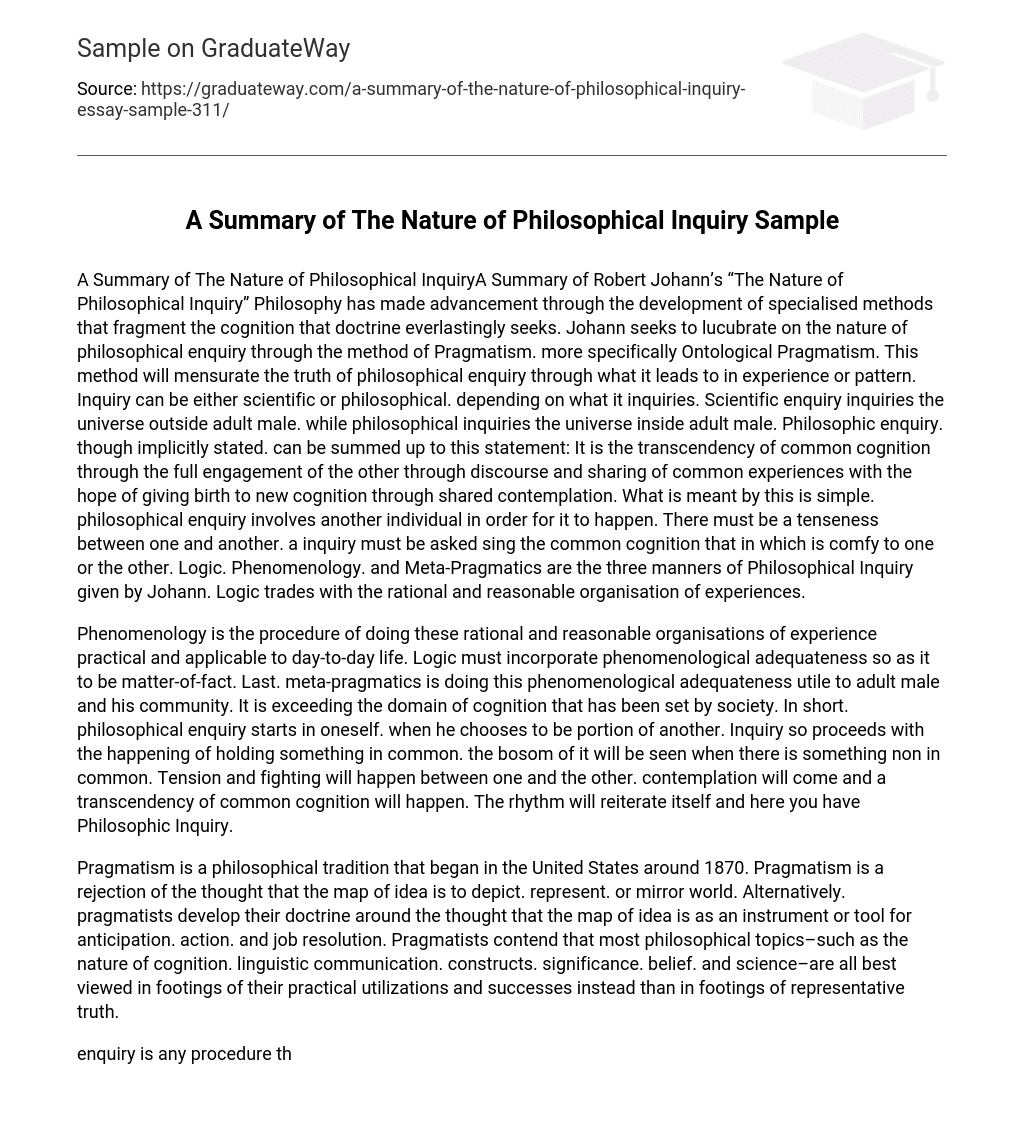A Summary of The Nature of Philosophical InquiryA Summary of Robert Johann’s “The Nature of Philosophical Inquiry” Philosophy has made advancement through the development of specialised methods that fragment the cognition that doctrine everlastingly seeks. Johann seeks to lucubrate on the nature of philosophical enquiry through the method of Pragmatism. more specifically Ontological Pragmatism. This method will mensurate the truth of philosophical enquiry through what it leads to in experience or pattern. Inquiry can be either scientific or philosophical. depending on what it inquiries. Scientific enquiry inquiries the universe outside adult male. while philosophical inquiries the universe inside adult male. Philosophic enquiry. though implicitly stated. can be summed up to this statement: It is the transcendency of common cognition through the full engagement of the other through discourse and sharing of common experiences with the hope of giving birth to new cognition through shared contemplation. What is meant by this is simple. philosophical enquiry involves another individual in order for it to happen. There must be a tenseness between one and another. a inquiry must be asked sing the common cognition that in which is comfy to one or the other. Logic. Phenomenology. and Meta-Pragmatics are the three manners of Philosophical Inquiry given by Johann. Logic trades with the rational and reasonable organisation of experiences.
Phenomenology is the procedure of doing these rational and reasonable organisations of experience practical and applicable to day-to-day life. Logic must incorporate phenomenological adequateness so as it to be matter-of-fact. Last. meta-pragmatics is doing this phenomenological adequateness utile to adult male and his community. It is exceeding the domain of cognition that has been set by society. In short. philosophical enquiry starts in oneself. when he chooses to be portion of another. Inquiry so proceeds with the happening of holding something in common. the bosom of it will be seen when there is something non in common. Tension and fighting will happen between one and the other. contemplation will come and a transcendency of common cognition will happen. The rhythm will reiterate itself and here you have Philosophic Inquiry.
Pragmatism is a philosophical tradition that began in the United States around 1870. Pragmatism is a rejection of the thought that the map of idea is to depict. represent. or mirror world. Alternatively. pragmatists develop their doctrine around the thought that the map of idea is as an instrument or tool for anticipation. action. and job resolution. Pragmatists contend that most philosophical topics–such as the nature of cognition. linguistic communication. constructs. significance. belief. and science–are all best viewed in footings of their practical utilizations and successes instead than in footings of representative truth.
enquiry is any procedure that has the purpose of augmenting cognition. deciding uncertainty. or work outing a job. A theory of enquiry is an history of the assorted types of enquiry and a intervention of the ways that each type of enquiry achieves its purpose.
Analogy1.a. Similarity in some respects between things that are otherwise dissimilar. B. A comparing based on such similarity. See Synonyms at similitude. 2. Biology Correspondence in map or place between variety meats of dissimilar evolutionary beginning or construction. 3. A signifier of logical illation or an case of it. based on the premise that if two things are known to be alike in some respects. so they must be likewise in other respects. 4. Linguistics The procedure by which words or morphemes are re-formed or created on the theoretical account of bing grammatical forms in a linguistic communication. frequently taking to greater regularity in paradigms. as evidenced by helped replacing holp and holpen as the past tense and past participial of aid on the theoretical account of verbs such as yip. yelped. yelped.





